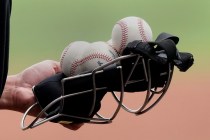Blood tests might not catch NFL’s cheaters but are solid first step
If the initial returns in from Congress are any sign, NFL commissioner Roger Goodell and union chief DeMaurice Smith scored a big hit by agreeing to blood tests for human growth hormone.
That's important because one of the reasons both pushed for HGH testing was to get politicians in the nation's capital off their backs. They seem to have succeeded, with influential California Democrat Henry Waxman quickly weighing in to congratulate all parties involved with a "welcome breakthrough in the campaign to rid sports of the scourge of doping."
I wouldn't go that far because, even with a blood test, the odds of catching anyone using HGH are remote. A player tested after, say, a morning practice almost would have had to shoot himself up just before breakfast to test positive.
But a breakthrough is a breakthrough even if in the near term it's largely a symbolic one. Until Goodell and Smith signed off on their deal, no major sport had any plans for blood testing, though baseball randomly has been testing the blood of minor leaguers for the past year or so.
Now the NFL will have it by opening day -- or at least Goodell hopes. Some details still need to be cleared up, namely concerns by players about how the tests will be conducted, how many there will be and how appeals will work. Just how they are settled will determine whether blood testing will be an effective deterrent or just a public relations gimmick.
Still, the fact that athletes in the nation's most popular sport agreed to have blood taken from their arm by a needle -- no urine test exists for HGH -- shows how far the pendulum in drug testing has swung in organized sports.
Those whose mission is to rid sports of performance-enhancing drugs aren't dancing in the streets over the agreement. They still see lots of possible holes through which drug cheats can run.
For now, though, they'll take it.
"To put in a test is certainly a win for clean athletes," said Travis Tygart, executive director of the U.S. Anti-Doping Agency. "How big a win will be the next question once details of how it will be implemented are released."
Goodell and Smith gave little indication what those details would be when they met Friday in Canton, Ohio, to sign the 300-page collective bargaining agreement that will be in place over the next decade. But it was notable that Smith later told the league-owned NFL Network that blood testing for HGH was necessary for the game's integrity.
That's a switch from years past, when unions in the major sports almost instinctively resisted drug testing as an invasion of personal rights. Lately, though, a new generation of players brought up in the steroid era has taken over, and those who are clean have come to the conclusion they don't want to be playing against others who have gotten stronger through the aid of modern chemistry.
"You can't have an advantage like that," Cowboys player representative Jason Witten said last week. "You've got to have an equalizer. I think we've seen in other sports how it's kind of blown up in their face a little bit."
Blood testing for HGH is not the panacea it might first appear to be. Issues linger, most notably that the time frame to catch cheaters is limited.
Indeed, to be caught, a player would have to be either stupid or unlucky. The test can detect HGH use within only 24 to 72 hours of blood being taken, and any Vegas bookmaker would laugh at the chances of that happening in a random draw.
Still, blood testing could serve as a deterrent, which is good in itself. And a new test under development could open the window for positive tests to 10 days or more from the time of usage.
Adding HGH testing can only strengthen the current NFL drug program, which last year involved some 14,000 urine tests. Players will have one more thing to worry about, one more reason not to inject themselves when the temptation to get bigger and get bigger money proves hard to resist.
And just maybe the number of 300-pounders running around like gazelles on NFL fields every Sunday will finally start to decrease.
But the greater significance of the agreement isn't necessarily the HGH test itself. That will be of limited value, at least until new, improved tests are implemented.
The big thing is getting players to agree at all to blood testing. The NFL is the first league to cross the line from samples in a cup to needles in the arm, and that line is a huge one to cross. Blood testing catches more things, and it's a good bet the list of things tested will eventually expand far beyond HGH.
Blood testing one day will become the norm, not only in the NFL but eventually in baseball and the NBA, too. Who knows, a time might even come when we can watch players on a field and not wonder what they took to get themselves there.
No, blood tests for HGH aren't going to catch many cheaters. But maybe it's a huge deal after all.
Tim Dahlberg is a Las Vegas-based national sports columnist for The Associated Press. Write to him at tdahlberg@ap.org or http://twitter.com/timdahlberg.

















